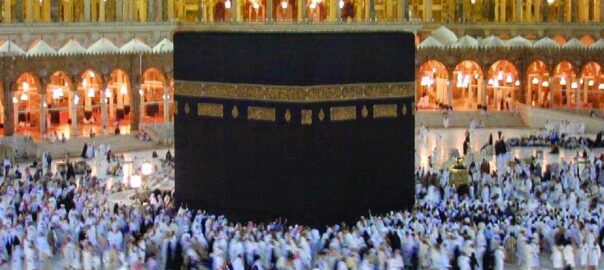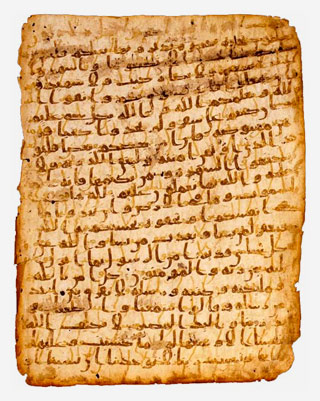
Muhammad: Origins of Islam:
A New Mindset
In addition to emphasizing a belief in one God and the importance of ethical behavior in all aspects of life, the new mindset promoted by Prophet Muhammad focused on personal responsibility and self-improvement, and on social justice and equality. He emphasized compassion, empathy and forgiveness and encouraged people to “Blossom Forth,” that is to strive to realize their full potential for positive change and for the benefit of others.
Muhammad never thought nor claimed to be inventing a new religion. He never sought power nor took advantage of his situation or status:
“I am nothing but a warner and a herald of glad tidings unto people who will believe.” (Qur’an 7:188)
“There shall be no coercion in matters of faith.” (Qur’an 2:256),
and again,
“But if they turn away from thee, O Prophet, remember that thy only duty is a clear delivery of the message entrusted to thee.” (Qur’an 16:82)
From the second revelation until his death he maintained a singleness of purpose as a Messenger of God to convey and carry out His wishes. He was tasked to restore the original monotheistic faith of Adam, Abraham and other prophets whose messages had become misinterpreted or corrupted over time. His revelations confirmed that the God of the “People of the Book” was the one and only Allah, God of all humanity, and that people should honor Him and only Him in life and deed. The Qur’an (42:13) says: “[God] has established for you the same religion enjoined on Noah, on Abraham, on Moses, and on Jesus.”
From the second revelation until his death he maintained a singleness of purpose as a Messenger of God to convey and carry out His wishes.
As Reza Aslan notes in No god but God, The Origins, Evolution, and Future of Islam, it is not surprising that: “There are striking similarities between the Christian and Qur’anic description of the Apocalypse, the Last Judgment, and the paradise awaiting those who have been saved.” But he points out that “These similarities do not contradict the Muslim belief that the Qur’an was divinely revealed, but they do indicate that the Qur’anic vision of the Last Days may have been revealed to the pagan Arabs through a set of symbols and metaphors with which they were already familiar, thanks in some part to the wide spread of Christianity in the region.”

Just as the first followers of Jesus did not consider themselves members of a new religion, neither did the initial “believers” close to Muhammad. The group included former pagans, Jews and Christians: monotheists who saw themselves as people trying to live in accordance with God’s rules and law. According to Fred Donner in Muhammad and the Believers: “Muhammad built a movement of devout spiritualists from many faiths who shared a few core beliefs: God was one, the end of the world was near, and the truly religious had to live exemplary lives rather than merely pay lip service to God’s laws. It was almost a century after Muhammad founded his ‘community of believers’ and launched the great Islamic conquest that his followers started to define their beliefs as a distinct religious faith.”
Muhammad was a gentle and contemplative man, he had no real status within the Quraysh and was not of the stature that the Arab world would expect for a prophet. As Karen Armstrong and others have noted, he was not a violent man but faced a violent, barbaric, corrupt, greedy and contemptuous world that he understood would destroy itself unless it changed. “Muhammad literally sweated with the effort to bring peace to war-torn Arabia. He realized that Arabia was at a turning point and that the old way of thinking would no longer suffice, so he wore himself out in the creative effort to evolve an entirely new solution.”
“Muhammad built a movement of devout spiritualists from many faiths who shared a few core beliefs…”
Those close to Muhammad were the first to believe in his revelations. Ali, who was taken in by Muhammad when his father, Abu Talib, was in financial distress, was the first; then Zayd, who remained at his side, although he had been a Syrian slave until he was given his freedom by Muhammad; the merchant Abu Bakr was the third to join the believers. He had a reputation for kindness and honesty and once he joined Muhammad others who knew him did the same.
The Messenger’s immediate goal was to bring the message of Allah to his own tribe, and many of the revelations were extremely difficult for the Quraysh to adopt. Not only had they to reject all their idols but their conduct had to change entirely—they had to submit their own will to the will of Allah.
Muhammad’s Mindset
In his book Muhammad, the World-Changer, Jebara writes that with the advent of Quranic revelations Muhammad’s “confidence had returned” after a low period during which he was disillusioned by Meccan society and personal tragedies (the death of his son). Following the revelations, as predicted by Khadija’s cousin, Waraqa Muhammad was persecuted and ridiculed, but he was able to counter that with a mindset that, Jebara writes, “combined …transcendent purpose, a distinctive positive attitude, and practical techniques for effective implementation.”
Jebara continues to outline key features of these three aspects of the Muhammadan mindset, including the following (Jebara’s words are italicized):
Transcendent Purpose
Material success does not bring fulfillment. Everyone has equal potential. People have to blossom and realize their hidden potential. Jebara also highlights a key factor contributing to this blossoming. It is to gather knowledge from a variety of diverse sources and then analyze the information to produce something new that can benefit others. [Elsewhere in his book, Jebara notes that the Prophet used the analogy of how bees produce honey to emphasize this important point.]
Positive Attitude
Blossoming is not easy, and the blossoming mindset cannot be forced. Instead, the impetus for blossoming comes from wanting to blossom. Indeed, Divine wisdom is everywhere and able to inspire those ready to recognize it.
There are setbacks on the path, and no one is perfect, but Jebara notes under this heading that the mindset encourages us to embrace imperfection because brokenness can provide an opportunity for growth. One can’t stay stuck in the past and nurse old wounds. The world is filled with creative potential. The path to success requires one to view the world positively.
Practical techniques
Persevere by remaining flexible and flowing around obstacles and turn setbacks into opportunities. One can’t go it alone, and so one must embrace mentors who can encourage one to blossom. Blossoming requires constant effort through reconnecting every day with the Divine, oneself and others. The goal should be the long-term (akhirah) with action-based hope (taqwa) and learning from the wisdom of previous generations (but not slavishly so, and not by remaining stuck in the old ways).
An excellent example of the Prophet’s can-do, upbeat, hopeful, and positive attitude is encapsulated in his advice quoted by Jebara: “If the world were ending before your eyes but you held a sapling in your hands, plant it! Don’t be concerned with its fate. Your task is to plant.”
External Stories and Videos

Quran Fragments Found in Britain Are Dated to the Birth of Islam
Dan Bilefsky, New York Times
The fragments appeared to be part of what could be the world’s oldest copy of the Quran, and researchers say it may have been transcribed by a contemporary of the Prophet Muhammad.
